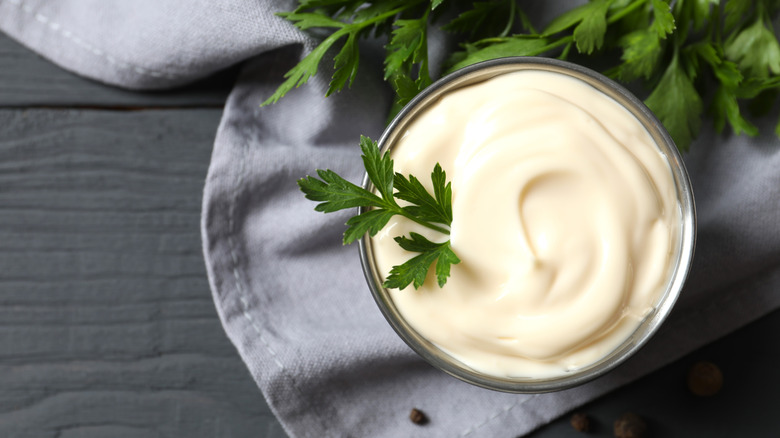Prue Leith's Pro-Tip For Saving Split Homemade Mayo
We may receive a commission on purchases made from links.
Prue Leith has had a long and storied career in pretty much every facet of the food industry, though you probably know her best as one of the judges of "The Great British Bake Off", a position she's held for nearly a decade. In that time, she's picked up quite a few tricks, which she's shared across her website, prue-leith.com, her social media accounts, and multiple cookbooks.
A new tip from her latest cookbook, "Life's Too Short to Stuff a Mushroom: Really good food without the fuss," helps you rescue a split or curdled homemade mayonnaise without having to toss anything out. All you need to do is partially start over with a fresh egg yolk, and carefully, slowly, mix your split mayo with the yolk a tiny bit at a time. Once it's revived, you can finish it off with the rest of your ingredients — waste not, want not.
Other Prue Leith tips for making homemade mayo
Resuscitating a nearly ruined mayonnaise isn't the only mayo tip Prue Leith gives in her newest cookbook. One point she makes clear is that homemade mayonnaise crafted with high-quality ingredients is always going to trounce anything store-bought. One example she gives is that mayo made with "a really rich olive oil ... [can turn] a simple salad or a grill into a gastronomic event." She also likes to use half canola and half extra-virgin olive oils for making her everyday mayo. Finally, she suggests using white wine vinegar instead of plain distilled, either on its own or in addition to a squeeze of lemon juice, to give mayo its tang without overpowering the delicate flavors.
She has more technique tips, including a simple way to make the oil-and-yolk-mixing step easier: Use something with a spout (she uses a jug or pitcher as examples) to pour the oil so it's tightly controlled. This is a big help, since mayo splits or curdles if you add too much oil at once. Finally, if you prefer to make your mayo with a blender or food procesor instead of whipping it by hand, she says to ensure that your recipe has enough volume so that the blades can make easy, full contact with it.

